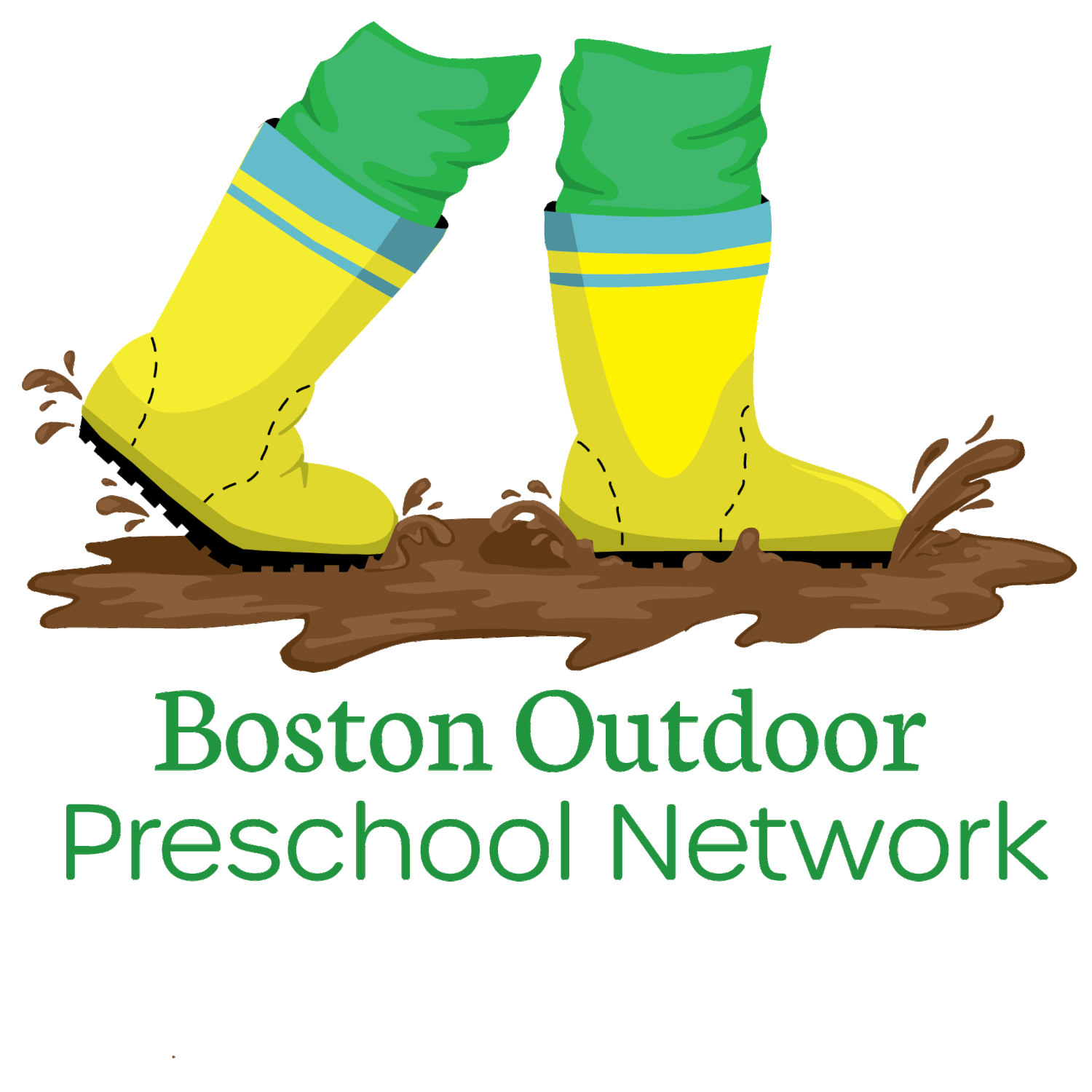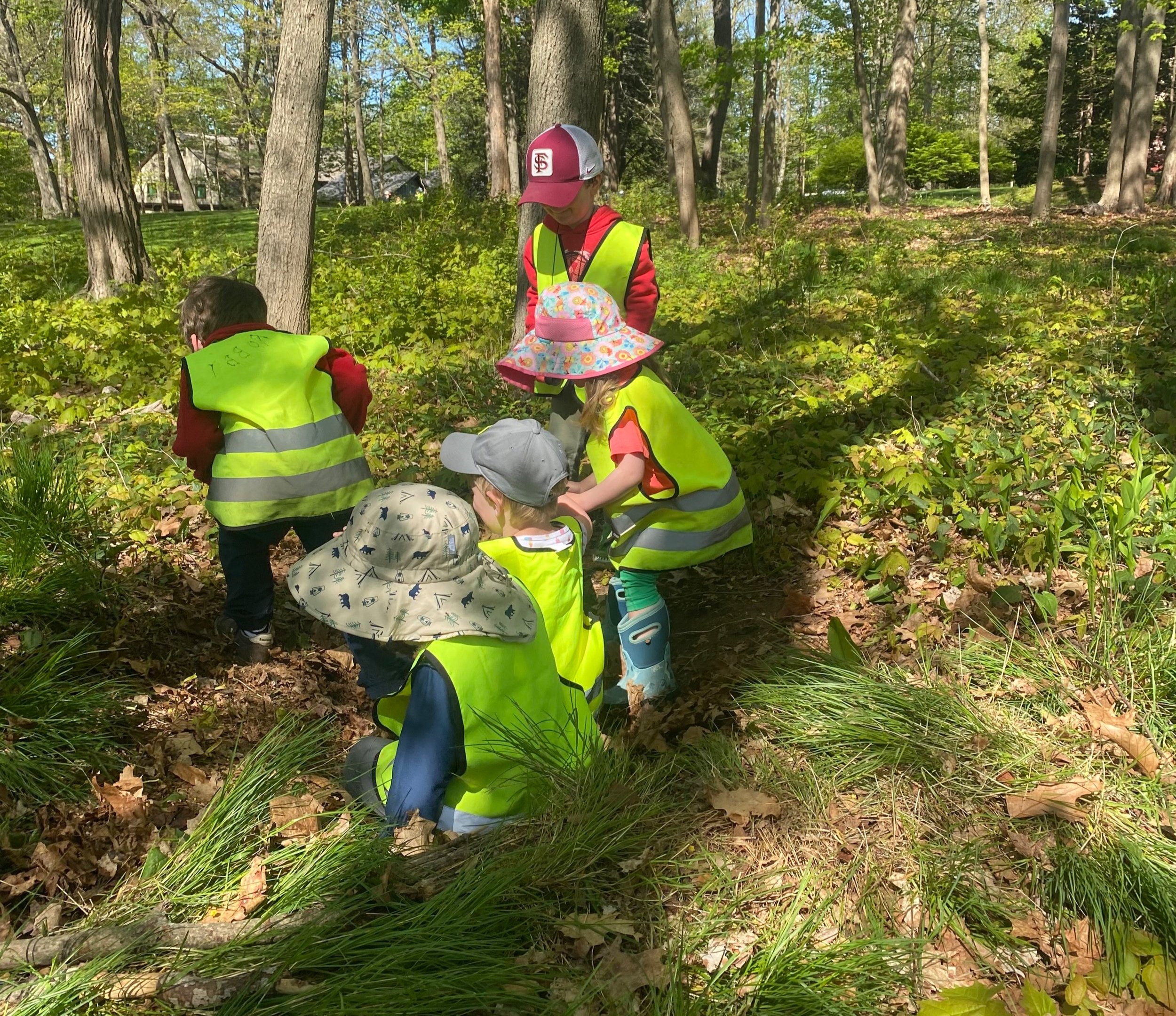BOPN Forest Days at BPS
BOPN Forest Days:
Expanding Access to Nature-Based Learning for Students in Boston Public Schools
Supporting Holistic Personal Growth while Cultivating Environmental Stewardship
by Marie O’Reilly, Senior Adviser, BOPN Nature Preschool & Forest Days
What we see everyday at BOPN is also reported in a blossoming body of research: experiences in nature improve academic learning, personal development, and environmental stewardship [1]. This is especially true for disadvantaged students and those who experience difficulties in traditional classroom settings [2]. Yet, structural challenges prevent children’s equitable access to outdoor environments, limiting their development, creativity, and emotional connection with nature and their communities.
We created BOPN’s Forest Days program in 2022 to meet a deep need in the City of Boston and its school system. Forest Days connects public school students with the natural world, providing children in urban areas with meaningful outdoor experiences that support their mental, physical, social, and emotional wellbeing, while cultivating a spirit of conservation. The rewards are recognizable, and the word is out – demand for Forest Days continues to grow, as more schools and educators learn about the program.
Fall Forest Days with Sumner Elementary School
Here’s a look behind the scenes of our Forest Days program with Sumner Elementary school from September through December 2024:
1. Provided thirty Forest Days sessions
In the first half of the 2024-2025 school year, BOPN brought consistent nature connection and playful outdoor learning to public school students through 30 Forest Days sessions. These sessions brought 55 pre-Kindergarten (K0 and K1) students outdoors to play and learn in nature!
100% of families who responded to our fall survey reported feeling “very satisfied” with our program. Indeed, beyond the effect on students, we helped seven BPS educators and several parent volunteers regularly benefit from time in nature.
2. Increased freedom and physical activity
Forest Days lets BPS students experience more freedom, increased physical activity, and greater connection with their bodies than a typical day in public school allows. For each weekly Forest Days session, students walked one half mile to and from the Arboretum, then hiked even further once inside. Upon arrival at our “adventure spot” for the morning, we created a spacious, inviting outdoor classroom with all the bells and whistles: a hill for rolling; open areas for running; vegetation to move around, over, or under; and logs to climb and balance on. The children gleefully moved their bodies freely, appreciating the variety of terrain across the landscape.
Our two hours together got students much closer to the 180 minutes of varied physical activity per day recommended by the World Health Organization for their age group [1]. Indeed, families who completed our Fall survey reported “the walk,” “rolling down hills,” and “lying on the ground and exploring” among their children’s favorite activities on Forest Days!
3. Improved mental health and prosocial behavior
Forest Days also provides space for quiet connection to oneself and to nature. One BPS educator was amazed to see a child with developmental disabilities, who struggled acutely to still his body in the indoor classroom, able to sit calmly on a blanket in the Arboretum for twenty minutes, engaging with the nature around him—apparently taking in the sky, trees, and breeze and having a quiet moment with himself. The same child then joined a group on another blanket in watercolor painting inspired by fall leaves. He approached the activity with an “unusual” amount of calm, distinct from the pattern of behavior exhibited in his indoor classroom.
This brought to life the research showing that problematic and disruptive behaviors are less frequent in natural settings than in the classroom [2] and students who previously experienced difficulties at school demonstrate better self-control [3]. Fewer disruptions from individual students has positive effects on the abilities of all children to concentrate, engage, and learn. The project supports increased participation of students with IEPs.
Apart from the many benefits for students, Forest Days also provides a welcome respite from the educators’ demanding, tightly-scheduled days. In fact, BPS staff were often the most enthusiastic participants in our regular deep breathing exercises, and moments of pause to listen to, watch, or feel the natural world around us. These offered an opportunity to step back, inhale immune-boosting phytoncides from pine trees, and return to their classroom feeling calmer [4].
4. Established a foundation for environmental stewardship
Forest Days leads children and their teachers from learning about nature, to playful learning in, with, and from nature. As one teacher noted, “My students always look forward to Forest Days! The learning they do in the classroom is brought to life when they are exploring in nature.” Indeed, nature provides the ideal grounds for experiential learning and emotional engagement–two key factors in playful learning that help information “stick.”
Families reporting that their child “loved discovering new aspects of nature - wild strawberries, squirrel nests” or “came home every Wednesday excited and sharing what she learned!” further confirms the research. And knowing that our content was more likely to be understood and to last–since children were excited and motivated to learn by the interactive nature of the outdoor environment–was sweet satisfaction.
Beyond any particular knowledge about nature, however, Forest Days laid a deeper foundation for environmental stewardship in the students we teach. In fact, 86% of families reported an increase in their child’s overall interest in nature. As we cultivated children’s sense of wonder while hiking through the Arboretum, we fostered their emotional connection to the landscape, and their thirst for knowledge–rather than merely feeding them facts. Here, the research supports our experience once more: Young children who made regular visits to a natural area over a long period of time showed a sense of caring for themselves, others, and the place they visited; as well as an ability to reflect on environmental issues and propose solutions [5].
5. Deepened engagement, a sense of belonging, and long-term program quality
This year, we partnered with child development experts at Learning Seeds to deepen children’s engagement with their peers, as well as their environment while playfully learning in nature. Learning Seeds practitioners collaborated with our teachers, modeling ways to nurture children’s engagement with the natural environment, formal and informal activities, group interactions, and the group’s pretend play and shared thinking. Children who were fearful of touching unfamiliar textures in nature were gently and thoughtfully guided to stretch their capacity for new sensory experiences. Those who previously remained on the group’s periphery were supported in joining the play and engaging in learning activities.
One family reported that Forest Days helped their child “feel more comfortable in her new K1 classroom.” A sense of belonging is yet another foundational element in a child’s ability to learn.
Learning Seeds helped us create scalable solutions to focus on each child’s engagement in the Forest Days program in the long term, leaving us with a suite of tips and strategies we look forward to using in coming seasons.
Vision for Forest Days
We strive to meet the growing demand for nature connection, and to expand our model within BPS while codifying best practices to share with schools across the nation wishing to start their own Forest Days program.
For the 2025 - 2026 school year, our dual focus is (a) immediately serving more students and schools in the BPS system, while (b) investing in personnel and organizational systems that will allow us to expand our capacity in coming years.
Please contact BOPN Executive Director, Sarah.Besse@bopn.org about ways to provide financial support and bring Forest Days to more Boston public schools requesting our program.
For information on volunteer opportunities with our spring 2025 Forest Days program at the Sumner, Manning, and Curley elementary schools, please reach out to hiring@bopn.org.
Learn more about this program in Boston Neighborhood Network’s video of Spring 2024 Forest Days.
We would like to acknowledge the Cabot Family Charitable Trust, Sumner Elementary School staff, parent volunteers, student volunteers from Northeastern, our collaborators at Learning Seeds, and our wonderful Forest Days staff Guénaëlle Maria and Marie O’Reilly for making our fall 2024 Forest Days season such a success!
Footnotes:
1. World Health Organization. 2019. Guidelines on physical activity, sedentary behaviour and sleep for children under 5 years of age. https://www.who.int/publications/i/item/9789241550536
2. Bassette L. A., Taber-Doughty T. (2013). The effects of a dog reading visitation program on academic engagement behavior in three elementary students with emotional and behavioral difficulties: a single case design. Child Youth Care Forum 42 239–256; Nedovic S., Morrissey A. (2013). Calm, active and focused: children’s responses to an organic outdoor learning environment. Learn. Environ. Res. 16 281–295; Chawla L., Keena K., Pevec I., Stanley E. (2014). Green schoolyards as havens from stress and resources for resilience in childhood and adolescence. Health Place 28 1–13.
3. Maynard T., Waters J., Clement C. (2013). Child-initiated learning, the outdoor environment and the “underachieving” child. Early Years 33 212–225; uiz-Gallardo J., Verde A., Valdes A. (2013). Garden-based learning: an experience with “at risk” secondary education students. J. Environ. Educ. 44 252–270; Swank J. M., Cheung C., Prikhidko A., Su Y.-W. (2017). Nature-based child-centered play therapy and behavioral concerns: a single-case design. Int. J. Play Ther. 26 47–57.
4. Li Q. (2010). Effect of forest bathing trips on human immune function. Environ Health Prev Med. Jan;15(1):9-17.
5. Boyd, D. (2019). Utilising place-based learning through local contexts to develop agents of change in Early Childhood Education for Sustainability. Education 3-13, 47(8), 983-997.

